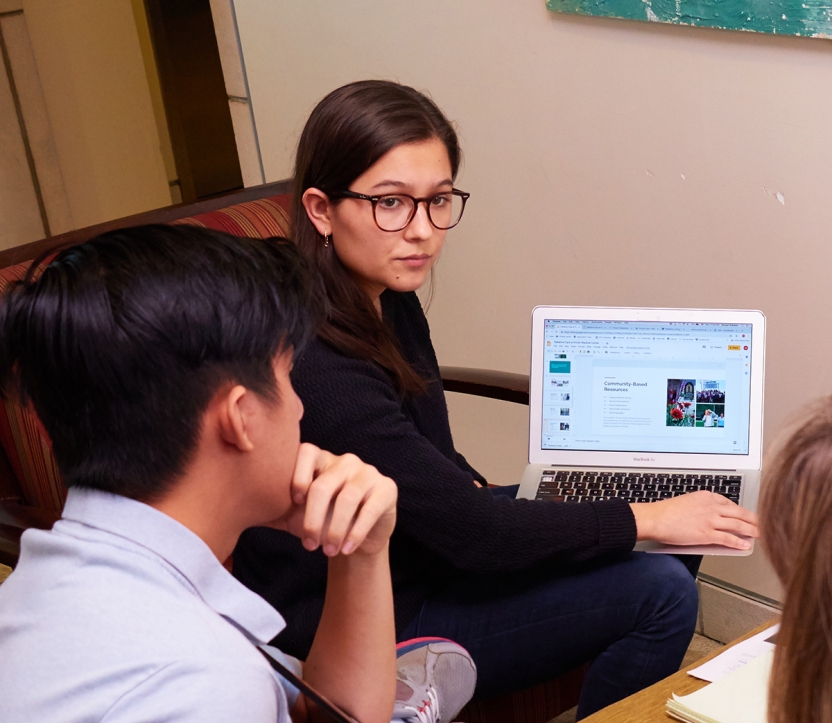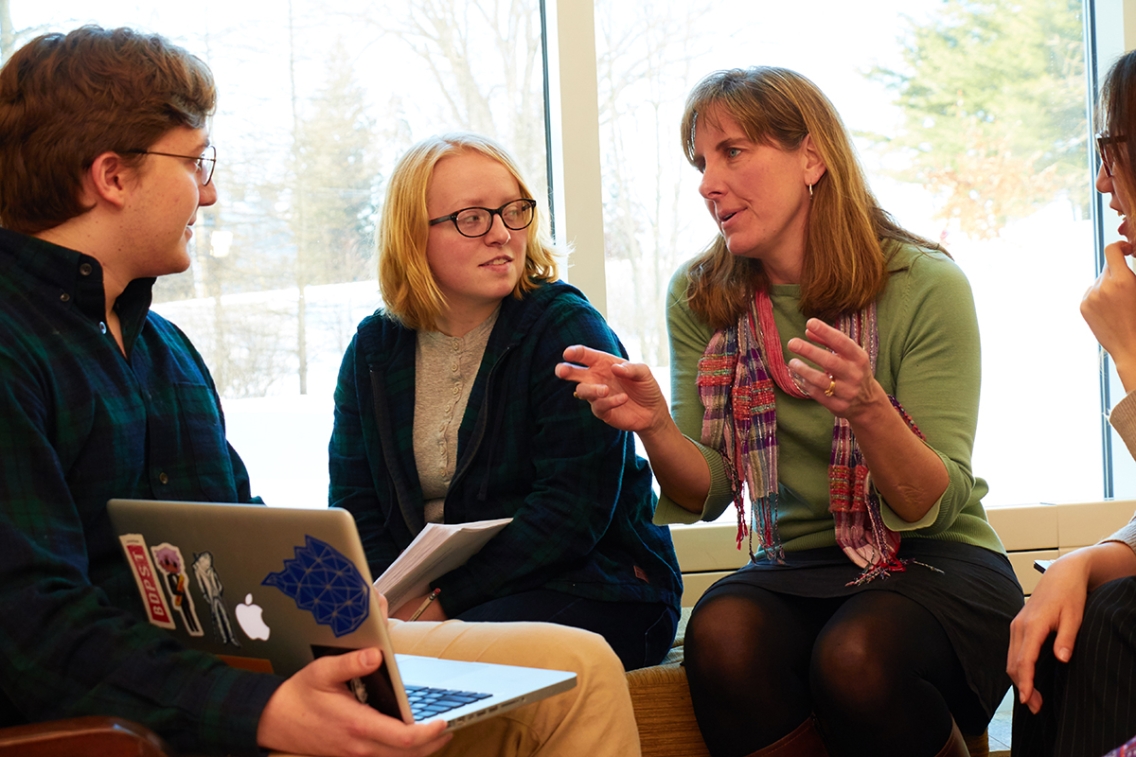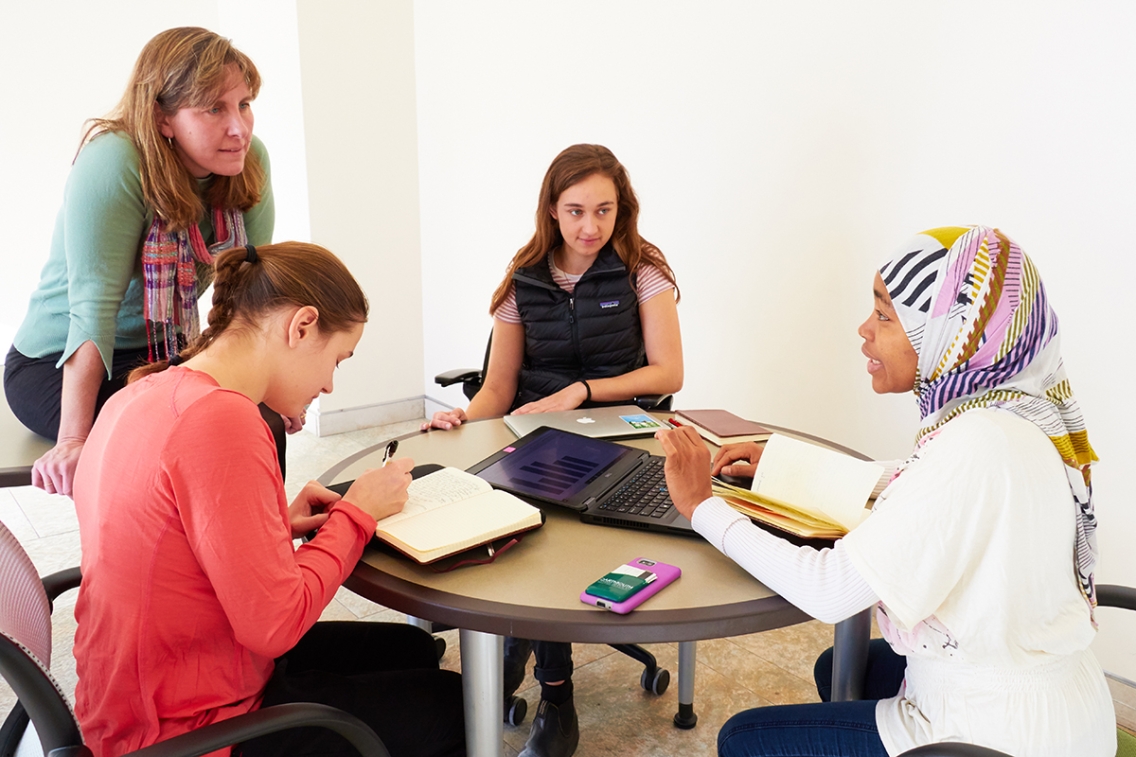Students Grapple with Health Policy at Local and Statewide Levels

MIDDLEBURY, Vt. – “Students want to know that their work matters,” says Professor of Economics Jessica Holmes. “That somebody’s listening, that somebody values what they’re doing. And they want to grapple with problems that people are really trying to solve. So, to the extent that I can bring that into my classes—it’s better for outside partners and better for students.”
This January, Holmes rolled out a brand-new opportunity for her students to engage in meaningful work. A specialist in the economics of healthcare, Holmes won the 2018 Gladstone Award Honoring Excellence in Teaching and used the $10,000 grant to pilot a new winter term course called Health Policy in Action. Ten students were chosen through a competitive process and placed in health-related internships in Montpelier, Burlington, and Middlebury.
Holmes said she looked for “win-win” situations where students’ energy and problem-solving abilities could be plugged into short-term projects with tangible results, applying her own deep knowledge of Vermont’s healthcare system as a member since 2014 of the state’s regulatory Green Mountain Care Board.

Professor of Economics Jessica Holmes, right, offers some advice to Samuel Caldwell ’19 on his final project as Madeleine Champagne ’19 looks on.
Students spent four days a week on assignment and met Mondays on campus, coming together to brainstorm, network, and examine their own goals, progress, and values. Typical of the kinds of mentoring that took place in class, Holmes gave each student a hardback notebook, saying, “If you walk into a meeting with a note-taking device, people take you more seriously.”
Vermont makes a great lab, Holmes noted, because it’s “on the leading edge of healthcare reform.” Holmes has used this “lab” repeatedly in her classes on health economics and policy. Students this past fall, for example, were encouraged to “think like consultants” in devising better approaches to the state’s Health Resources Allocation Plan.
Many of the students who were drawn to the pilot program aim to be doctors. Others want to go into health policy. All want to make a difference.
“The area that I grew up in had very visible healthcare disparities,” said senior Madeleine Champagne. “So I want to help with that. I want to help people access the care that they need.”
Champagne was assigned to the Vermont House Committee on Healthcare and worked closely with Chair William Lippert, supplying brief research reports as requested. Among the first she put together was one on the long-term effects of adverse childhood experiences (ACEs).
“One of the challenges, for me, was trying to figure how to distill something that’s so complicated into something that’s short enough that people who are very, very busy will want to read it and can understand it,” said Champagne, a neuroscience major and premed. “I learned that I really like distilling the science down.”

Clockwise: Katie Aman ’19 (in red), Professor Jessica Holmes, Ansley Harralson ’20.5, and Fatmata Bah ’20 discuss work on their final projects.
Champagne describes her internship overall as “a deep dive into health policy.” She took in expert presentations on Vermont’s proposed all-payer model, the Green Mountain Care Board, Medicaid, and Medicare. She gained “a solid understanding of how bills are proposed, and how the legislature works.” Champagne concluded her internship by giving a presentation to the full committee on the cost-effectiveness of increasing primary care.
Junior Ansley Harralson, a microbiology and biochemistry major and global health minor, had interned abroad in healthcare-related internships in Chile, Rwanda, and Nepal, but wanted more exposure to domestic healthcare systems. She interned for Ena Backus, Vermont’s director of healthcare reform.
Backus said that initially she was excited to mentor a Health Policy in Action intern but also skeptical.
“I was really excited about Dr. Holmes’s Health Policy in Action program because I thought it would be a fun and dynamic learning experience for the students and might pique some interest in the policy field. But I was pretty skeptical that a student could provide much substantive help. My skepticism was happily unnecessary. Ansley Harralson embraced every opportunity to contribute to our work; she worked quickly to research topics we wanted more information about, she provided fabulous notes on various topics of legislative testimony, and she took on the challenge of trying to visually depict Vermont’s entire healthcare and human services system!”
As a prospective physician, Harralson said the internship changed her views on “healthcare bureaucracy.”
“It was very enlightening to see how much the people that are involved in that government structure of healthcare really do care about making the changes. It just is a slow process and they can’t do everything.”
Depending on their interests and assignments, students tackled various problems for their host organizations. Sophomore Bayu Ahmad, a biochemistry major, pursued his interests in environmental sustainability in his internship at the UVM Medical Center, analyzing how local water sources affect the environmental impact of reusable vs. disposable medical equipment. Yihe Jiang, a junior interning with the Vermont Association of Hospitals and Health Systems, organized two conferences on ACEs that will take place in May: one for physicians and one for the general public. Working with the UVM Health Network’s director of strategic and business planning, economics major Stefan Morgan, a sophomore, applied behavioral economics to the challenges of moving from a fee-for-service to an all-payer system.
At Porter Medical Center, senior Morgan Nakatani assessed ways to expand palliative care while junior Kristine Su analyzed waste reduction and environmental impact.
Hospital President Fred Kniffin, also a longtime ER doc, praised the Health in Action internships as bringing extra bandwidth to critical issues for the hospital.
“I gave Kristine the task of making an inventory of what we’re already doing because I had a sense that stuff was happening out there but nobody knows about it… . She did a great job of inventorying what we’ve done so we could feel good about ourselves; and then, as expected, the second part was ‘Tell us what more we could do.’ It’s a treasure trove. It’s a buffet of opportunity here in terms of things we could do that would save us money and contribute to the environment.”
While the hospital and College have long partnered in providing premed students opportunities to shadow physicians, Kniffin praised Health Policy in Action for bringing students in on the administrative side.
“We’ve all felt like there’s all this talent over at Middlebury College, and we’ve thought from time to time, ‘How can we tap into these brilliant young people to help us?’” said Kniffin.
Kniffin hopes to bring Su back during the spring semester to continue her work on environmental sustainability at Porter. Other mentors praised their interns’ contributions and are also hoping to extend projects into the spring semester.
Among those continuing their projects into the spring is senior Katie Aman, who interned with the Green Mountain Care Board on the data science end of the legislature’s mandated update to the state’s Health Resources Allocation Plan. Aman, an English and American literatures major, discovered an unexpected love of data crunching—this past year, when she took courses in statistics and data science.
“Closing the gaps between communities so that everyone can kind of live better lives—it’s really important to me,” said Aman, who stressed that in choosing a career path she wanted to take all she’s gained from her liberal arts education and “pay it forward.”
Aman said while friends have pointed out the marketability of various applications of data science, she’s driven by a moral compunction to address social issues.
“I’m really interested in the intersection of health policy and how these decisions can be data informed,” said Aman. “Like I’m really interested in water. How do we get good water to everybody in this country? Clearly there’s a problem. So, what does the data say about it? And if we don’t have the data, why isn’t it being collected? How do we solve these issues? How do we get good at it?”
By Gaen Murphree; Photos by Todd Balfour

